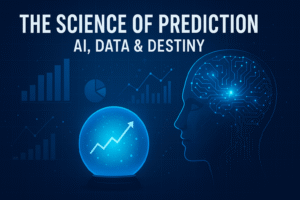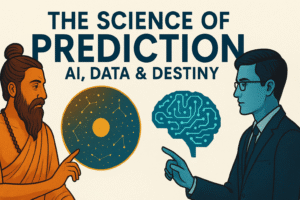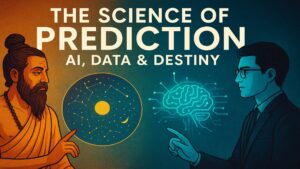
From Data to Destiny
The Science of Prediction: AI, Data & Destiny
Humanity has always been captivated by the unknown. What will happen tomorrow? Can the future be shaped, or is it written in destiny? From the seers of ancient civilizations to modern artificial intelligence (AI), the pursuit of prediction reflects our eternal quest for certainty in a world full of uncertainty. Today, with data science and AI, this age-old desire has entered a new era—one where algorithms sit alongside astrologers, and probability meets philosophy.
The Ancient Desire to Know the Future
In the earliest civilizations, prediction was rooted in spirituality and observation of nature. Ancient Egyptians studied the stars, Indian sages calculated planetary movements, and Greek oracles interpreted divine messages.
In Vedic tradition, jyotish shastra (astrology) connected human destiny with cosmic rhythms.
Farmers once looked to the position of the moon and monsoons to decide when to sow crops.
Kings consulted sages before wars, believing that time itself carried clues about victory or defeat.
These traditions may not have had computers or algorithms, but they were built on the same principle that drives modern prediction: patterns lead to foresight.
Data: The Modern Oracle
Today, the stars have been replaced by sensors, satellites, and supercomputers. Data is the new scripture, and AI is the modern interpreter.
Weather & Climate: AI forecasts cyclones, rainfall, and even long-term climate change by analyzing vast atmospheric data.
Medicine & Health: Predictive analytics can warn of epidemics, suggest personalized treatments, and even foresee potential genetic risks.
Finance & Economics: Stock predictions, risk assessments, and consumer behavior models guide billion-dollar decisions.
Daily Life: From Google Maps predicting traffic to Netflix suggesting what you will watch, AI has become a silent companion in shaping our choices.
Just as an ancient sage needed sacred texts and meditation to make predictions, AI requires data and algorithms to reveal probabilities.

Table of Contents
Is Prediction the Same as Destiny?
Here lies the philosophical tension: if AI can predict our actions—what we buy, where we go, even whom we might date—does this mean our destiny is fixed?
The answer is complex. Prediction is not the same as fate.
Prediction = Probability: AI says what is likely to happen.
Destiny = Choice + Circumstance: Human will, creativity, and unexpected events can always change the outcome.
For example:
AI might predict you will order food online tonight. But you may decide to cook at home instead.
A doctor may use predictive models to warn of illness, yet lifestyle changes can alter that future.
Thus, prediction shows a path, but destiny is shaped by decision.
Lessons from Ancient Wisdom
Ancient Indian philosophy often balanced karma (actions), daiva (destiny), and purushartha (human effort). Even if certain outcomes were destined, effort could alter or delay them.
This is surprisingly similar to how AI works: it presents probabilities, not certainties. The wisdom of the ancients reminds us that no matter how advanced prediction becomes, human free will and the mystery of time will always play a role.
The Responsibilities of Prediction
With great power comes great responsibility. AI predictions, if misused, can harm rather than help.
Privacy Concerns: Predictive AI often relies on personal data. Without protection, it risks invading human dignity.
Bias in Algorithms: If training data is biased, predictions may reinforce inequality—for example, in hiring or policing.
Over-Reliance on Machines: Blind faith in algorithms may weaken human intuition, wisdom, and moral judgment.
Prediction should serve as a guide, not as a master. The challenge for our age is ensuring that AI prediction remains ethical, transparent, and humane.
The Future of Prediction
The horizon of predictive science is expanding:
Quantum Computing: May allow AI to calculate possibilities far beyond today’s limits.
Neuroscience + AI: Could predict emotional reactions or mental health patterns.
Global Foresight: With satellites, sensors, and AI, humanity may predict natural disasters before they occur.
Yet, even as AI sharpens foresight, mystery will never disappear. Destiny may always contain an element that cannot be measured—what spiritual traditions call karma, grace, or divine will.

Conclusion
The science of prediction has traveled a long road—from ancient oracles to AI algorithms, from astrology to data science. What unites them is humanity’s longing to glimpse the future.
AI may help us prepare, plan, and reduce uncertainty, but it cannot fully define destiny. Life is not a fixed equation—it is a dance of patterns, choices, and mysteries. Perhaps the true wisdom lies in balancing both: using predictive science as a compass, while remembering that the future is still an open book, written by human effort and the unseen rhythms of the universe.
Frequently Asked Questions (FAQs)
- What does “prediction” mean in the context of AI?
Prediction in AI means using past data and algorithms to calculate the probability of future outcomes, such as weather, health risks, or consumer behavior.
- How is prediction different from destiny?
Prediction shows what is likely to happen, while destiny combines chance, free will, and circumstances. AI gives probabilities, but humans can still change outcomes through choices.
- Did ancient civilizations also try to predict the future?
Yes. Ancient cultures used astrology, divination, and observation of natural patterns to make predictions. In India, jyotish shastra connected planetary movements with human life.
- Can AI really predict human behavior?
AI can predict patterns like shopping habits or viewing preferences, but it cannot fully account for free will, creativity, or unexpected events.
- Is AI prediction always accurate?
No. Predictions are probabilities, not certainties. AI accuracy depends on the quality of data, the algorithm, and external factors.
- What are the benefits of predictive AI?
It helps in disaster preparedness, early disease detection, traffic management, financial forecasting, and even personal convenience (like recommendations on Netflix or YouTube).
- What are the risks of AI prediction?
Risks include data privacy violations, algorithmic bias, misuse in surveillance, and over-reliance on machines for decision-making.
- How does AI prediction connect with ancient philosophy?
Just as ancient philosophies taught that destiny is shaped by both karma (actions) and daiva (cosmic factors), AI shows patterns but cannot fully define outcomes—reminding us that free will still matters.
- Will future AI make destiny predictable?
Even with advanced technologies like quantum computing, predictions will remain probabilities. The element of mystery—what some call karma or divine will—cannot be removed from life.
- Should humans trust AI predictions blindly?
No. AI predictions should be used as guidance, not as absolute truth. Human wisdom, ethics, and free will are essential in making final decisions.
Summary
Prediction has always fascinated humanity—from the ancient wisdom of astrology and oracles to modern AI algorithms fueled by big data. Today, artificial intelligence helps forecast weather, health, finance, and even personal choices. But prediction is not the same as destiny. AI shows probabilities, while destiny is shaped by human free will, choices, and circumstances.
Ancient philosophies remind us that while the future may hold patterns, it also holds mystery. AI must be used responsibly, ensuring ethics, privacy, and fairness. The future of prediction will combine science and spirituality, probability and possibility—offering guidance, but never absolute certainty.
Unlock the Ancient Wisdom of Sanatan Dharma – Join Us on YouTube!
👉 Subscribe now to Prachin Sanatan Dharma and embark on a journey of enlightenment.
Explore timeless teachings, spiritual insights, and cultural richness on our YouTube channel, Prachin Sanatan Dharma. Dive deep into the essence of Sanatan Dharma through captivating videos that inspire and educate.
Related Articles
- Restful Nights: Ayurvedic Remedies and Traditional Indian Practices to Overcome Insomnia and Late-Night Habits
- The Tridevi: Lakshmi, Saraswati, and Parvati – Their Roles and Powers
- “Divine Creatures of Ancient Indian Scriptures: Exploring the Role of Animals in the Vedas, Puranas, and Mahabharata”
- Nature and Spirituality: Exploring the Sacred Essence of the Himalayas, Ganga, and Other Natural Wonders”
- “Reviving the Gurukul System: Relevance and Lessons for Modern Education”
- “Exploring Greek and Indian Mythology: Similarities Between Greek and Indian Mythology “
- “Embracing Sattvic Living: Harmonizing Mind, Body, and Soul Through Food and Lifestyle”
- “Charity and Prosperity: Exploring the Concept of Daan and Its Financial Relevance in Modern Life”
- How to Build an Eco-Friendly Home Inspired by Vastu Shastra
- Comparison of Ancient and Modern Sports: How Traditional Sports Have Influenced Contemporary Games
- “Timeless Lessons from Ancient Tales: Linking Samudra Manthan and Ganga’s Descent to Modern Ecological Challenges”
- “Reviving Sanskrit: How AI is Preserving Ancient Languages for the Future”
- “Mathura: The Sacred Land of Lord Krishna’s Divine Leelas”
- Investing for Future Generations: Lessons from Indian Traditions on Legacy Building and Wealth Preservation
- “Ancient Indian Wisdom: Timeless Lessons for Tackling Today’s Climate Crisis”
- “Artificial Intelligence and Spirituality: Transforming Ancient Practices for the Modern World”
- “Gold and Real Estate in India: Timeless Assets Shaping Financial Strategies”
- Tradition Meets Innovation: The Evolution of Technology in Hindu Rituals
- End-of-World Myths: Exploring Kali Yuga in Hinduism and Ragnarök in Norse Mythology
- Garuda, Pegasus, and Dragons: The Universal Ties of Mythical Beasts Across Cultures
- “Ancient Vimanas: Mythical Flying Machines or Evidence of Advanced Technology?”
- Time Travel in Hindu Mythology: The Fascinating Tales of Kakudmi and King Raivata
- “Divine Feminine Power in Hindu Mythology: The Legends of Durga, Saraswati, and Lakshmi”
- “Divine Beings of Sanatan Dharma: The Spiritual Significance of Sacred Animals in Hinduism”
- “Symbolism in Mythological Art: Unlocking Hidden Meanings in Ancient Temple Carvings”
- “Exploring Technological Advancements in Ancient India and Civilizations: Vimana, Metallurgy, & Water Management systems”
- Unveiling the Mysteries: Ancient Temples of Sanatan Dharma , Mysterious Temples of India
- “The Scientific Knowledge of Sanatan Dharma: Ancient Wisdom Meets Modern Science”
- Ancient Indian Sports and Games: Celebrating a Legacy of Skill, Strength & Strategy”
- “Exploring the Cosmic Link: The Connection Between Astronomy and Vedic Astrology”
- The Power of Sanskrit: Unlocking the Divine Language of the Gods
- “The End of Kaliyuga: A Sanatan Insight into the World’s Final Chapter”
- Explore more articles on Prachin Sanatan Yuga.
From Data to Destiny: The Science and Spirituality of AI Predictions From Data to Destiny: The Science and Spirituality of AI Predictions From Data to Destiny: The Science and Spirituality of AI Predictions From Data to Destiny: The Science and Spirituality of AI Predictions From Data to Destiny: The Science and Spirituality of AI Predictions From Data to Destiny: The Science and Spirituality of AI Predictions
From Data to Destiny: The Science and Spirituality of AI Predictions From Data to Destiny: The Science and Spirituality of AI Predictions From Data to Destiny: The Science and Spirituality of AI Predictions From Data to Destiny: The Science and Spirituality of AI Predictions From Data to Destiny: The Science and Spirituality of AI Predictions From Data to Destiny: The Science and Spirituality of AI Predictions
From Data to Destiny: The Science and Spirituality of AI Predictions From Data to Destiny: The Science and Spirituality of AI Predictions From Data to Destiny: The Science and Spirituality of AI Predictions From Data to Destiny: The Science and Spirituality of AI Predictions From Data to Destiny: The Science and Spirituality of AI Predictions From Data to Destiny: The Science and Spirituality of AI Predictions
From Data to Destiny: The Science and Spirituality of AI Predictions From Data to Destiny: The Science and Spirituality of AI Predictions From Data to Destiny: The Science and Spirituality of AI Predictions From Data to Destiny: The Science and Spirituality of AI Predictions From Data to Destiny: The Science and Spirituality of AI Predictions From Data to Destiny: The Science and Spirituality of AI Predictions
Humanity has always been captivated by the unknown. What will happen tomorrow? Can the future be shaped, or is it written in destiny? From the seers of ancient civilizations to modern artificial intelligence (AI), the pursuit of prediction reflects our eternal quest for certainty in a world full of uncertainty. Today, with data science and AI, this age-old desire has entered a new era—one where algorithms sit alongside astrologers, and probability meets philosophy.
Humanity has always been captivated by the unknown. What will happen tomorrow? Can the future be shaped, or is it written in destiny? From the seers of ancient civilizations to modern artificial intelligence (AI), the pursuit of prediction reflects our eternal quest for certainty in a world full of uncertainty. Today, with data science and AI, this age-old desire has entered a new era—one where algorithms sit alongside astrologers, and probability meets philosophy.
